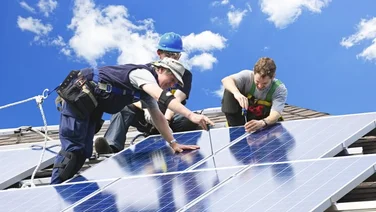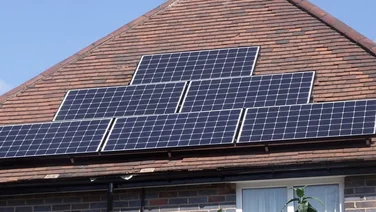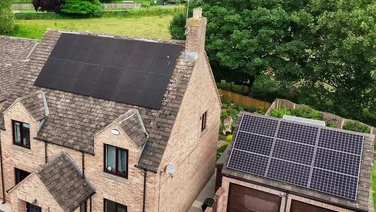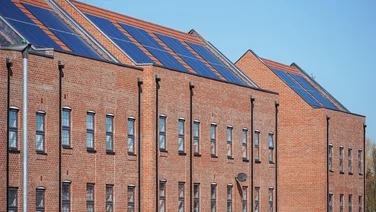- Solar panels will typically cut Isle of Wight homes’ electricity bills by 80%
- The Isle of Wight is one of the UK’s sunniest places, which means higher savings
- More than 4,200 homes on the island already have solar panels
With solar panel grants, the cost of solar panels is falling, which is great news for anyone on the Isle of Wight who’s looking to lower their electricity bills.
The average three-bedroom household on the island will save £526 with solar panels, allowing you to break even in 13.4 years and spend the next decade or two making pure profit.
Solar panels on the Isle of Wight typically generate 16% more solar electricity than the UK average, thanks to the island’s particularly sunny weather.
We’ve gone into more detail below – and if you want to go solar at any point, you can compare solar panel prices with our help. Just provide a few quick details, and our expert installers will be in touch with free quotes for you to compare.
Where do you want to install solar panels?
Get started
How much do solar panels cost on the Isle of Wight?
Solar panels on the Isle of Wight cost £705 per 350-watt (W) solar panel, on average.
A system with 10 of these panels – which adds up to the 3.5 kWp (kilowatt peak) we recommend for the average three-bedroom house – will therefore cost £7,050.
This is the same price you’ll typically pay in England – and with the Isle of Wight sitting just four miles off the English coast, that’s no surprise.
This solar panel system will cut your electricity bills by £526 per year, according to our calculations, meaning you’ll typically break even after 13.4 years – and solar panels usually last for at least 15 more years after that point.
You’ll save this money by using the free solar energy you generate, and by selling any solar power you don’t use back to the grid, which is made possible by the Smart Export Guarantee.
Do solar panels work in Isle of Wight weather?
Solar panels work excellently in Isle of Wight weather.
The island is one of the sunniest places in the UK, due to its position just south of the mainland – which enables solar panels here to produce more electricity.
The Isle of Wight’s windy nature and mild temperatures are also positives, as they guard against your solar array overheating, which is the main threat to its output.
And solar panels still provide plenty of electricity when it’s cloudy and rainy – even if they do generate more when it’s sunny – so there’s no need to fret too much about the weather forecast.

Are solar panels worth getting on the Isle of Wight?
Solar panels are absolutely worth getting on the Isle of Wight.
An average Isle of Wight household will cut its electricity bills by 80% with solar panels, and break even on the initial cost in 13.4 years.
For a typical three-bedroom house, that means an annual saving of £526.
Over the course of the 25-year guarantee that most manufacturers will give you, that means you’ll make a total net profit of £8,497 – and most solar panels last longer.
You’ll also reduce your dependence on the electricity grid, and play your part in the fight against climate change.
Solar panels will shrink your carbon footprint by 0.55 tonnes of CO2 per year, on average – and multiple studies have shown your new array will make it more likely that your neighbours jump on the solar bandwagon.
It’s worth going solar wherever you live in the UK, but the Isle of Wight is particularly well-located to make the most of this green investment.
How many people have solar panels on the Isle of Wight?
There are 5,427 homes with solar panels on the Isle of Wight, according to the Microgeneration Certification Scheme (MCS) as of July 2024.
That means 8.3% of Isle of Wight households have solar panels, which is well above the current UK tally of 4.9%.
Companies clearly share residents’ enthusiasm for installing solar panels on the island, as shown by Low Carbon’s now-accepted plan to build a large solar farm just outside Yarmouth.
When it goes online, Barnfield Solar Farm should provide enough electricity to power more than 9,300 homes.
Government grants for solar panels on the Isle of Wight
There are two government grants for solar panels that people living on the Isle of Wight can access: the UK government’s Energy Company Obligation (ECO4) scheme, and the Warm Homes Local Grant.
Before March 2025, you could also take advantage of the Home Upgrade Grant, which has now been scrapped. Here’s everything you need to know about them.
ECO4
The ECO4 scheme compels large energy suppliers to pay for measures like solar panels to be installed in disadvantaged households.
If you power your home’s heating system with electricity, you may be able to qualify for free solar panels if you fulfil any of these criteria:
- Your household income is less than £31,000 per year
- You’ve been referred to ECO4 by your doctor, energy supplier, or local authority
- You receive one of a list of government benefits
You may also be able to get free insulation through ECO4, as your home must be well-insulated before you’re allowed to receive free solar panels.
To access ECO4, just get in touch with your energy provider.
If your supplier isn’t running a scheme on the Isle of Wight, you can also contact Warm Up Wight, City Energy Network, or Distinction Energy, who’ve all been approved by the council to carry out ECO4 measures.
Home Upgrade Grant (now discontinued)
Before being scrapped in March 2025, 45 local authorities in England, including Portsmouth City Council, partnered with 22 other authorities, including the Isle of Wight Council.
Hundreds of millions of pounds were allocated to the Home Upgrade Grant scheme before it was closed in March 2025.
While this grant has now closed, you might want to consider its replacement, the Warm Homes Local Grant, for potential funding. This grant offers funding for low-income households with an EPC rating between D and G. It covers various energy efficiency measures, including solar water heaters, particularly for homes off the gas grid.
The scheme also offers grants for double glazing, heating controls, heat pumps, insulation, and solar thermal panels.
Does the Smart Export Guarantee apply to the Isle of Wight?
The Smart Export Guarantee does apply to the Isle of Wight, thankfully.
That means you can get paid for all the excess solar energy you export to the grid.
The average three-bedroom household on the Isle can save £184 per year by signing up to the highest rate that anyone can access – which is currently Scottish Power’s SmartGen 12p per kWh tariff.
And if you get your electricity from British Gas, Octopus, OVO, or ScottishPower, you should be able to access even better rates.
Next steps
The next step is to analyse your electricity usage and work out how much you can save on your energy bills by buying solar panels.
Then you’ll want to get as many solar panel quotes as you can, to ensure you get the best possible deal on your installation.
You can kick-start this process by using our free comparison tool. Simply fill in a few details and our trusted suppliers will get in touch with free quotes.







